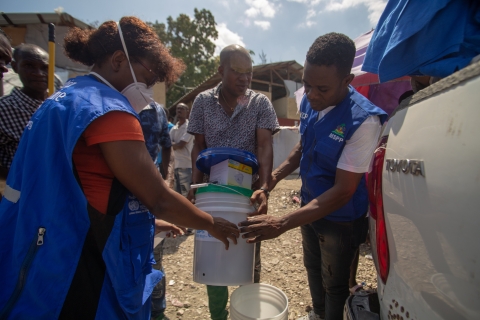
The security expedition in Haiti faces uphill battle against well-armed gangs.
The following article was published in the September-October 2024 issue of NewsNotes.
Four hundred Kenyan troops are now in Haiti’s capital, Port au Prince, as part of the UN-led Multinational Security Support (MSS). As reported in our July/August Issue, the mission is met with skepticism about its likelihood of success from various sectors of Haitian society. The lack of confidence over the forces’ ability to stabilize Haiti has only increased due to inadequate resources and personnel and the alleged corruption of the Transition Presidential Council.
A resident of Port au Prince said to a Maryknoll missioner recently, “Although the Haiti National Police and the Kenya Police carried out an operation in Gressier [a commune about 12.5 miles west of Port au Prince], I prefer to wait and see if the gangs will return to the area. Meanwhile, in Croix des Bouquets [a township only 8 miles east of the capital], the gangs are still gaining territory even with the presence of MSS.”
A CNN report from August 10 tells how a gang invaded the Catholic Institut Montfort boarding school for deaf students at the heart of Croix des Bouquets, and the school did not receive any security support despite being just a mere 8 miles away from where the MSS team is stationed. The nuns who run the school for the deaf, the students and the staff have joined the more than 600,000 internally displaced persons.
In another instance detailed in the CNN report, a MSS patrol convoy traveling through the capital city was shelled by gangs, and the convoy had no choice but to retreat in painfully slow three-point turns. The armored vehicles did not have turrets from which to return fire.
The town of Gantheir, 25 miles east of the capital, was attacked by one of Haiti’s largest gangs, 400 Mawozo, on July 22. When Haitian and Kenyan security forces arrived, the gang was long gone, the streets deserted, the police department destroyed, and some residents had been tortured and killed.
While the Haiti National Police and MSS have reported some success in areas of Port au Prince, including the arrests of 60 people, gangs maintain control over 85% of the metropolitan area of Port-au-Prince.
When there is insecurity anywhere, women and children suffer more adverse consequences. According to the United Nations International Children’s Fund, in only two out of the ten Haitian departments (departments being analogous to provinces or states in other countries) there were 919 schools that were closed as of June of 2024. The closure of these schools affects over 156,00 children who are vulnerable to gang recruitment. School closures adversely affect childhood prospects and increase the rate of illiteracy in the country.
Women and girls have disproportionately borne the brunt of the insecurity and displacement as targets of gender-based violence. To further aggravate the disproportionality, the Transitional Presidential Council does not include women’s perspectives. The only woman on the team is a council observer. Such exclusion will continue to perpetuate perennial discrimination and gendered violence.
The Maryknoll Office for Global Concerns joined 18 other faith-based groups in a letter to Secretary of State Antony Blinken outlining concerns for the success of the MSS Haitian mission, since the United States remains the single largest sponsor of the mission. The letter emphasizes the United States’ responsibility to create accountability mechanisms in consultation with Haitian civil society to address the corruption that is a significant cause of distrust Haitians have for their transitional government.
And lastly, the gang’s arms advantage would not be possible in the island nation—which does not manufacture weapons—without a supply of arms and ammunition from abroad. A UN report estimates that Haitian law enforcement could be outgunned ten to one, with guns largely originating from the United States. The United States must do more to prevent the illegal arms smuggling that enables the violence in Haiti.
An article from the United States Institute of Peace, “Mapping Haiti’s Road Toward Justice: Lessons from Colombia and Guatemala,” considers Colombia’s transitional restorative justice model and Guatemala’s hybrid prosecution system as useful lessons for the current approach in Haiti. The Institute thereby offers alternative and supplemental nonviolent approaches for dealing with Haiti’s crisis.
On September 25-26, a coalition of 40 faith-based groups, including the Maryknoll Office for Global Concerns, plans to descend on Washington, DC, for Haiti Advocacy Days: Stop Illegal U.S. Arms to Haiti to meet with Congress and the Biden Administration.
Faith in action
Write to Congress to elevate the Haiti Advocacy Days’ message https://mogc.info/ARMAS
Photo of the UN PAHO/WHO support for crisis in Haiti, Fonds CERF - United Nations OCHA, via Flickr.
